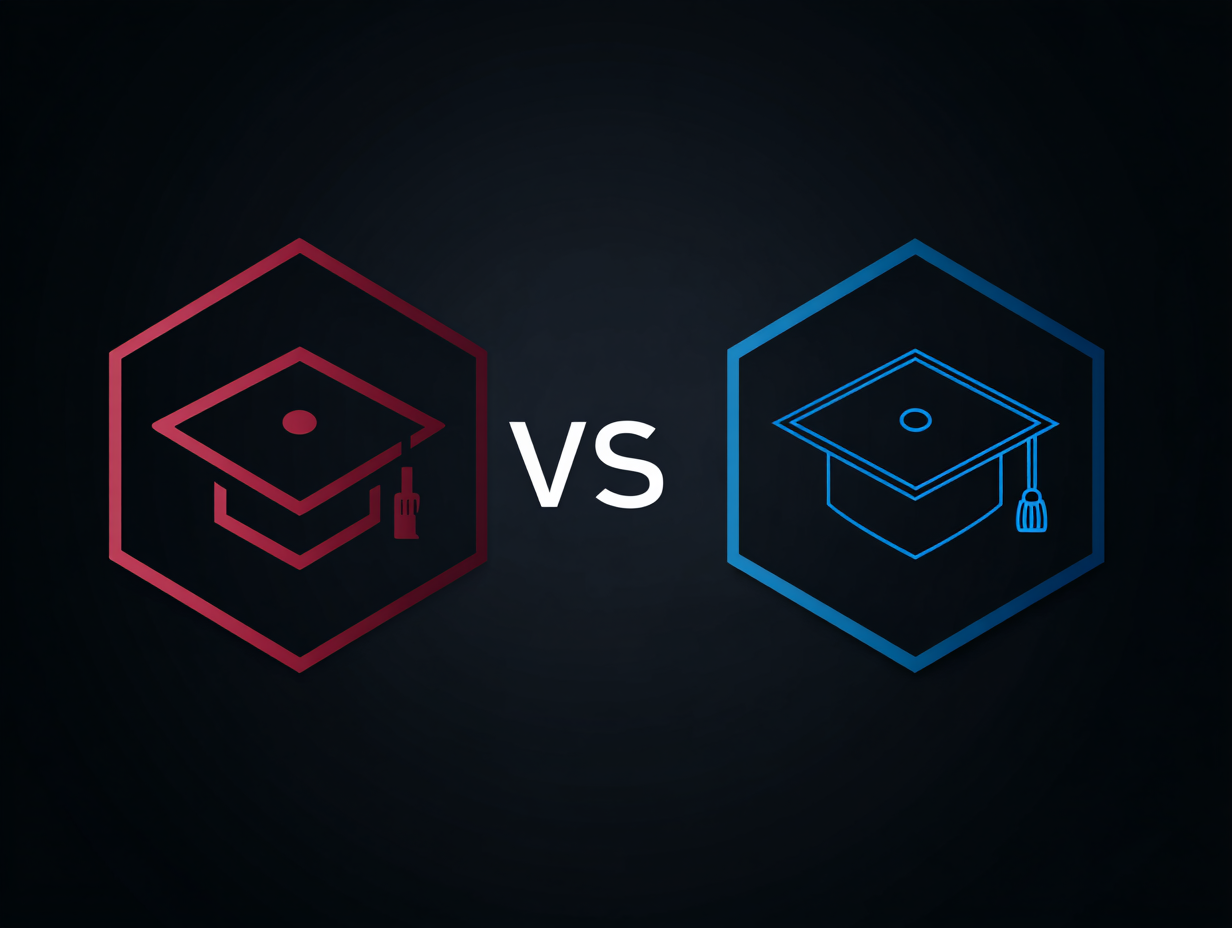Micro-Credentials vs Degrees: What Actually Gets You Hired
I once hired a guy with a master’s in marketing—smart, polished, great on paper. But when I asked about running a basic A/B test? He froze—like I’d just spoken Martian. Smart guy, sure. But useful in the real world? Not even close.
That’s when I realized the whole debate is kind of a trap. Truth is, we’ve been asking the wrong question this whole time—and it’s costing people jobs. If you’re sending résumés into a black hole, the piece of paper you have—or don’t have—is the wrong thing to focus on.
Table of Contents
The Two Contenders: A Quick Breakdown
No buzzwords. No brochure speak. Here’s what this really boils down to.
Traditional Degree
The establishment. The big, slow path that promises a deep foundation. It’s an accredited signal that you can commit to something. For a lot of automated HR systems, it’s still the password that gets you past the front gate. For now.
Micro-Credential
Certs, badges, nano degrees—whatever you call them, they exist for one reason: speed. Universities move at a glacial pace. These certs? You’re job-ready before a university even picks a committee.
Traditional Degrees: The Slow-Moving Behemoth
It’s not dead—but let’s not pretend it’s thriving either. In some fields, sure, it still opens doors. But calling it the “safe bet” these days? That’s wishful thinking. The market has moved. Academia hasn’t.
The Case For It (If You Squint)
- The Network. You’re often paying for access. The right alumni network can be a powerful shortcut.
- The Foundation. A *good* program, and that’s a big if, does teach you how to analyze and argue from first principles. That’s a durable skill.
The Brutal Reality
- Ancient Curriculum. The course catalog is often a museum of last year’s technologies. It’s approved so slowly that it’s practically obsolete by the time it reaches a student.
- The Debt Sentence. A mortgage-sized loan… for what? A piece of paper that might impress HR but won’t teach you how to run a real project.
- The Theory-Practice Chasm. This is the big one. You can graduate with a 4.0 and still be functionally useless on day one of a real job. I’ve seen it happen more times than I can count.
Micro-Credentials: The Fast and Furious Fix
These have exploded for one reason: they solve an immediate, painful problem. But “fast and cheap” has its own pitfalls.
Why They Often Win
- Speed. This is their killer feature. Learn a marketable skill in weeks, not years.
- Relevance. The best ones are from the source—Google, Amazon, HubSpot. They teach what the industry actually wants.
- Proof of Initiative. Someone with a recent, relevant cert is showing me they’re hungry. Honestly? I’d hire that person over someone with a dusty degree, any day.
Where You Can Get Burned
- It’s a Minefield. The market is flooded with garbage credentials. It’s on you to spot the fakes.
- Shallow Knowledge. They teach you the “how,” not always the “why.” That can leave you stranded when you face a problem that isn’t in the course material.
The Head-to-Head: A Brutally Honest Look
Here’s the blunt version you won’t get from career counselors.
Traditional Degree
- Who is this for, really? Aspiring doctors, lawyers, and people who want to work at massive, slow-moving corporations where HR hasn’t updated its rules since 2005.
- The Time Sink: Four years. An eternity.
- What you actually get: A signal of commitment and a massive bill.
- The Financial Gamble: Huge. Potentially ruinous.
Micro-Credential
- Who needs this? Everyone else. Career-changers, people feeling stuck, anyone who wants a specific skill without going bankrupt.
- Time to Impact: Weeks. Maybe months.
- The Payoff: A job-ready skill. Now.
- The Catch: You have to be your own quality control.
What Actually Works (Hint: It’s Not Picking a Side)
The smartest people I know aren’t picking a side. They’re not debating this over coffee. They’re just learning what they need to learn, using whatever tool works.
The Pragmatic Approach
It’s simple. Got a degree? Great, you checked a box. Now go get certified in the software companies actually use. Got the bootcamp cert? Nice—you’re in. Now patch the holes with a night class. Let the company cover the tab.
Making Your Call: Stop Theorizing, Start Doing
The path is different for everyone. Anyone who tells you there’s a single “right” way is selling something.
- New to the game? Nobody cares about your GPA. Show me what you’ve built—or how fast you can learn. A killer portfolio and a respected cert for $3k might be a smarter bet than a $150k degree.
- Hit the wall? Another degree won’t cure burnout. You need one skill—razor-sharp, job-ready, and fast.
- Starting from scratch? You need proof—fast. A cert plus a solid project beats any speech about “passion.” It shows you can deliver.
Forget the debate. Nobody’s got time for TED Talk logic. Ask yourself this: what’s one skill you could learn today that would actually get you hired faster? No magic formula. Just pick something and go.
Frequently Asked Questions
Seriously, do employers respect micro-credentials now?
They respect results. And names they trust. A cert from Google? Sure. Some random badge you bought off Instagram? Not a chance.
Can I really get a good job without a college degree?
In tech or design? Yep—if your work speaks for itself, nobody cares. But if you’re chasing a VP title at a Fortune 100 company, not having a degree might still raise eyebrows. Pick your game.
What’s the real ROI difference?
Degrees have a longer, slower payoff horizon. Micro-credentials are all about immediate ROI. If a $2,000 cert helps you land a $15,000 raise, it paid for itself in two months. You’ll be waiting a decade or more for your student loans to hit that kind of break-even point.
How do I avoid getting scammed by a worthless credential?
Ask one question: “Where are the graduates now?” If the provider can’t show you a list of alumni on LinkedIn who have the jobs you want, run. Look for rigorous final projects or proctored exams, not just multiple-choice quizzes.






Leave a Reply